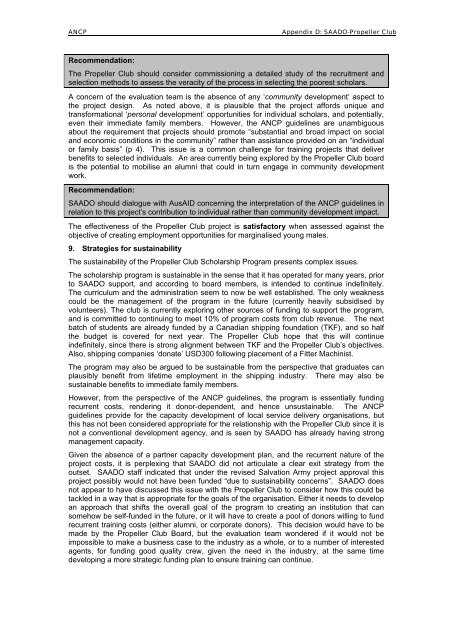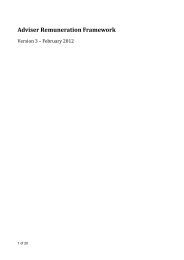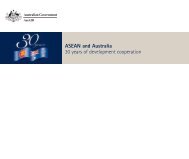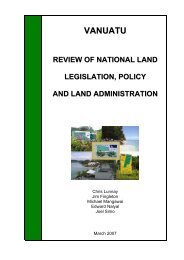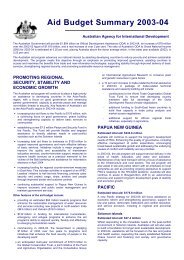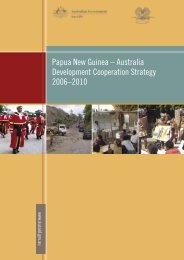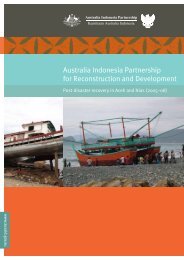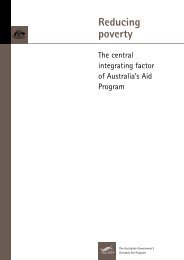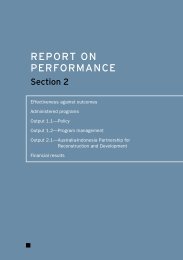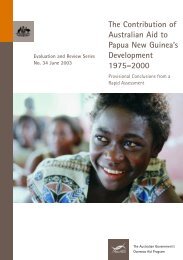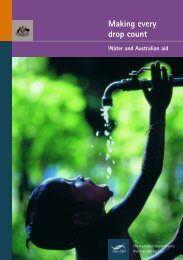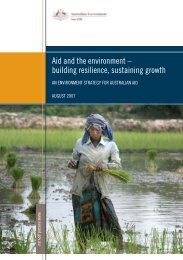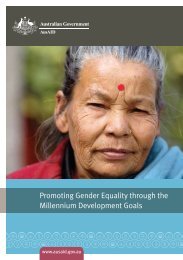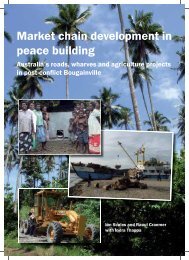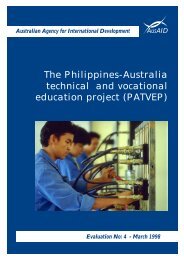ANCP Philippines Cluster Evaluation Report - AusAID
ANCP Philippines Cluster Evaluation Report - AusAID
ANCP Philippines Cluster Evaluation Report - AusAID
You also want an ePaper? Increase the reach of your titles
YUMPU automatically turns print PDFs into web optimized ePapers that Google loves.
<strong>ANCP</strong>Appendix D: SAADO-Propeller ClubRecommendation:The Propeller Club should consider commissioning a detailed study of the recruitment andselection methods to assess the veracity of the process in selecting the poorest scholars.A concern of the evaluation team is the absence of any ‘community development’ aspect tothe project design. As noted above, it is plausible that the project affords unique andtransformational ‘personal development’ opportunities for individual scholars, and potentially,even their immediate family members. However, the <strong>ANCP</strong> guidelines are unambiguousabout the requirement that projects should promote “substantial and broad impact on socialand economic conditions in the community” rather than assistance provided on an “individualor family basis” (p 4). This issue is a common challenge for training projects that deliverbenefits to selected individuals. An area currently being explored by the Propeller Club boardis the potential to mobilise an alumni that could in turn engage in community developmentwork.Recommendation:SAADO should dialogue with <strong>AusAID</strong> concerning the interpretation of the <strong>ANCP</strong> guidelines inrelation to this project’s contribution to individual rather than community development impact.The effectiveness of the Propeller Club project is satisfactory when assessed against theobjective of creating employment opportunities for marginalised young males.9. Strategies for sustainabilityThe sustainability of the Propeller Club Scholarship Program presents complex issues.The scholarship program is sustainable in the sense that it has operated for many years, priorto SAADO support, and according to board members, is intended to continue indefinitely.The curriculum and the administration seem to now be well established. The only weaknesscould be the management of the program in the future (currently heavily subsidised byvolunteers). The club is currently exploring other sources of funding to support the program,and is committed to continuing to meet 10% of program costs from club revenue. The nextbatch of students are already funded by a Canadian shipping foundation (TKF), and so halfthe budget is covered for next year. The Propeller Club hope that this will continueindefinitely, since there is strong alignment between TKF and the Propeller Club’s objectives.Also, shipping companies ‘donate’ USD300 following placement of a Fitter Machinist.The program may also be argued to be sustainable from the perspective that graduates canplausibly benefit from lifetime employment in the shipping industry. There may also besustainable benefits to immediate family members.However, from the perspective of the <strong>ANCP</strong> guidelines, the program is essentially fundingrecurrent costs, rendering it donor-dependent, and hence unsustainable. The <strong>ANCP</strong>guidelines provide for the capacity development of local service delivery organisations, butthis has not been considered appropriate for the relationship with the Propeller Club since it isnot a conventional development agency, and is seen by SAADO has already having strongmanagement capacity.Given the absence of a partner capacity development plan, and the recurrent nature of theproject costs, it is perplexing that SAADO did not articulate a clear exit strategy from theoutset. SAADO staff indicated that under the revised Salvation Army project approval thisproject possibly would not have been funded “due to sustainability concerns”. SAADO doesnot appear to have discussed this issue with the Propeller Club to consider how this could betackled in a way that is appropriate for the goals of the organisation. Either it needs to developan approach that shifts the overall goal of the program to creating an institution that cansomehow be self-funded in the future, or it will have to create a pool of donors willing to fundrecurrent training costs (either alumni, or corporate donors). This decision would have to bemade by the Propeller Club Board, but the evaluation team wondered if it would not beimpossible to make a business case to the industry as a whole, or to a number of interestedagents, for funding good quality crew, given the need in the industry, at the same timedeveloping a more strategic funding plan to ensure training can continue.<strong>ANCP</strong> <strong>Philippines</strong> <strong>Cluster</strong> <strong>Evaluation</strong> <strong>Report</strong> (ver. 2.0)XLVI


